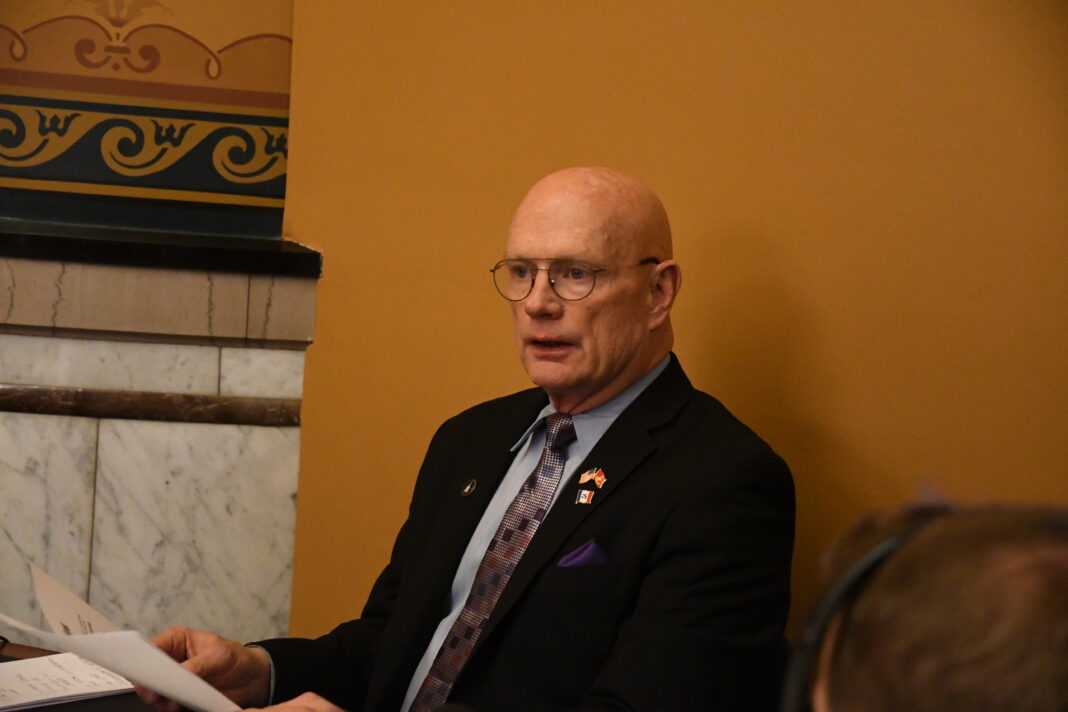Republican State Representatives Skyler Wheeler and Steve Holt advanced a bill through a House subcommittee that would prohibit guaranteed income programs by Iowa cities and counties. Holt provided the most passionate defense of the bill, calling guaranteed income programs “socialism on steroids.”
Democrat State Rep. Beth Wessel-Kroeschell, though, defended guaranteed income programs and expressed disappointment
“I have a lot of concerns about this bill,” Wessel-Kroeschell said. “Local governments have a history of providing some incredible leadership. I believe in local control. This type of bill takes that away.”
Wessel-Kroeschell said there is only one program in the state she is aware of that provides a guaranteed income. That program is producing “some very interesting results,” she said.
Jake Highfill, who represents Iowans for Tax Relief, said the organization fully supports the bill as it is “wealth distribution” and could impact property taxes.
However, Luke Elzinga, the policy and advocacy manager at the Des Moines Area Religious Council, said the DMARC Food Pantry network assisted more than 65,000 unique individuals in greater Des Moines. And over the past year, the group has shattered monthly records going back nearly 50 years.
“We are registered against this bill,” he said.
Elzinga called it a “complex issue” and noted it would take nonprofits, the private sector and government to address it.
The group has supported the Uplift Central Iowa Basic Income Pilot since its inception.
“Basic income is not some fringe, leftist idea,” he said. “In fact, it’s supported by a number of conservatives and libertarians. It’s not hard to see why. Basic income gives families the financial freedom to use funds in the best way to support themselves.”
Elzinga said in pilot programs across the country, participants have used the majority of basic income to support families with basic needs such as food, housing, health care, transportation and clothing.
“And that’s exactly what we’ve seen in the preliminary data for Uplift in Central Iowa,” he said.
Oliver Bardwell, who said he represents Iowans 4 Freedom, said he doesn’t believe it is the responsibility of landowners and taxpayers to support such programs.
“Allowing local governments to raise their taxes or take tax money from people who are struggling to pay their real estate taxes already – I think that’s wrong,” Bardwell said.
The Uplift Central Iowa pilot program is being implemented in Dallas, Polk and Warren counties. Program supporters claimed to support cost-effective policies and programs that address poverty while also supporting a healthier, more consistent workforce.
With more than 20 communities represented in the pilot, it is the first pilot program in the country that has the rural, micropolitan and metropolitan focus as part of one single study.
The study is a 24-month study and final analysis will be provided in the summer of 2026.
Andy Conlin, who represents the Opportunity Solutions Project, said that even though federal funds may be mixed in to cover the cost of the program, local governments are spending more than $800,000 on the program.
“Ultimately those are taxpayer dollars that we believe can be put to better use and would like to see that put to better use in the future,” Conlin said.
Some potential participants in the program declined because they didn’t want the income to impact public benefits they already received.
“So these are folks who are already receiving some form of public support,” he said. “This is just another layer on top of that.”
The money received through the program can be used anywhere a Visa card can be swiped, he added.
Jamie Cashman said the Iowa State Association of Counties is opposed to the bill because it has a history of opposing legislation that provides preemption for counties.
Lena Tucker Reinders, who is the executive director of Iowa Public Health Association, said the organization is concerned the bill would cost some of the “tools” to stop “generational poverty.”
Representative Wheeler said he “absolutely” believes guaranteed income is a “fringe, leftist idea.”
“I think this is insane,” he added. “It creates more reliance on government. It takes from hard-working taxpayers and gives to those who are not. It is likely political by nature. You’re not going to, as a voter, you’re not going to cut off the hand that feeds you. It will increase taxes. We have tens of thousands of great paying jobs all across the state, there are employers who will move mountains to get you in there to work for them. If localities have enough money to do this, they have way too much money.
“And I will just say, as these fringe ideas keep coming up, Representative Holt and I are going to keep smacking them down.”
Representative Holt said it isn’t yet clear to him where the funds are coming from, but according to the data, the total amount of money going out is $865,000 taxpayer dollars.
“So we have roads to fix. We have nursing homes to fund. We have a lot of things that we need to fund that are legitimate functions of government,” Holt said. “This isn’t one of them.”
Holt did the math, noting the 110 participants who receive $500 a month for 24 months will result in $1,320,000 in payments.
“Now, I’m gonna tell you right now, this is socialism on steroids,” Holt said. “This is a redistribution of wealth. This is an attack on American values. This is an attack on the work ethic in this country when we already are struggling. Every business owner I speak to is struggling to find employees that are willing to work. Part of this, in my judgment, is because of the multitude of entitlement programs that now allow able-bodied individuals to not work. And this is yet another example of that.”
Holt said he isn’t being critical of help for people who legitimately cannot work, but of people who are “perfectly capable” of working but choose not to.
“It’s an attack on American values because America is about achieving anything you want to achieve based on your hard work,” Holt said. “It is not about equal outcomes. It is about equal opportunity. And there’s one hell of a difference between equal outcomes and equal opportunities.”
In the 80s, Holt read a book about Soviet farmers who allowed their crops to rot in the field because regardless of how hard they worked, the government would come and take their income and redistribute it.
“There was no reason for them to work whatsoever,” Holt said. “They literally left crops rotting in the field. That is documented fact. And this is the kind of garbage that leads to that kind of thing.”
Finally, Holt said he has taken note and is “amazed” by the list of opposition. He was critical of the Iowa Association of Counties because local rule doesn’t extend to “socialism on steroids.”
“You should really rethink your position,” he said.
As for the religious organizations, Holt said he is reminded of the importance of teaching people to fish as opposed to handing them a fish. He suggested everyone read the book “Toxic Charity.”
“If I have anything to do with it, no programs like this are going to start in the state of Iowa or are going to be allowed to continue in the state of Iowa because they are destructive,” Holt said. “They are the opposite I believe of what those who support these things are trying to achieve.”
















